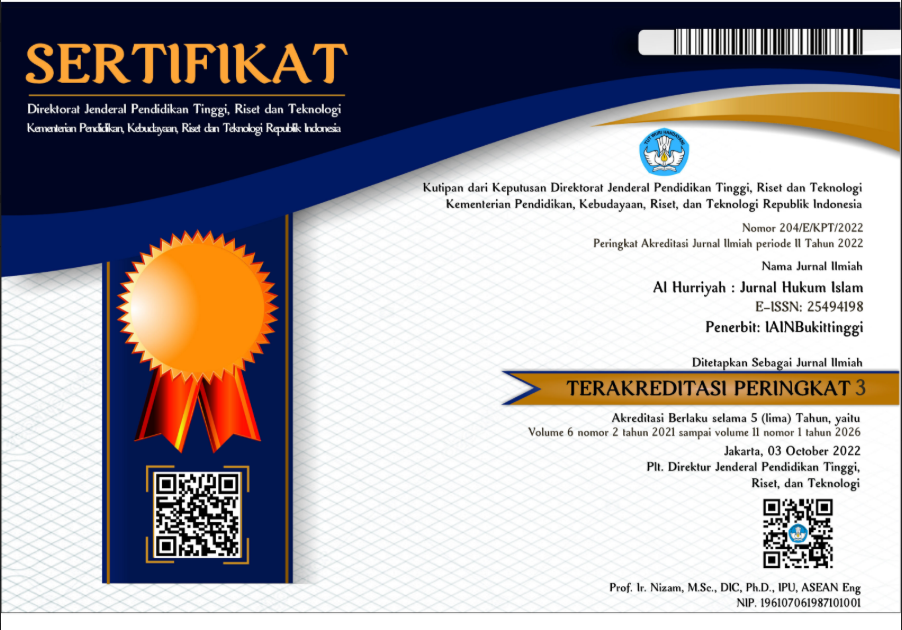Euthanasia dalam Pandangan Moral, Kode Etik Kedokteran dan Perspektif Hukum Islam
DOI:
https://doi.org/10.30983/alhurriyah.v5i2.3205Keywords:
Euthanasia, Medicine, Morals, Islamic LawAbstract
Praktik Euthanasia dalam kedokteran menjadi hal yang menimbulkan berbagai perbincangan bila dilihat dari sudut pandang yang berbeda. Adanya perbedaan pendapat yang muncul dari praktik euthanasia merupakan suatu kewajaran karena praktik tersebut berhubungan dengan nyawa manusia. Berdasarkan hal tersebut studi ilmiah ini bertujuan untuk mengetahui euthanasia dalam pandangan moral, kode etik kedokteran dan dalam perspektif hukum Islam. Proses pengumpulan data studi ilmiah ini dilakukan dengan cara penelitian literatur menggunakan metode deskriptif kualitatif dalam penyajian dan anlisis data yang diperoleh. Hasil dari penelitian menunjukkan bagaimana praktik euthanasia yang sesuai kode etik kedokteran, pandangan moral dan bagaimana hukumnya dalam agama Islam.
References
Buku satu Penulis
Achadiat. Eutanasia Yang Semakin Kontroversial. Jakarta: Terajana, 2002.
Ahmad, Hanafi. Asas-Asas Hukum Pidana Islam, 1967.
Anwar, Moch. Hukum Pidana Bagian Khusus (KUHP Buku II). Bandung: Alumni KP, 1979.
Chazawi, Adami. Kejahatan Terhadap Tubuh Dan Nyawa. Jakarta: PT. Raja Grafindo Persada, 2001.
Djazuli. Fikih Jinayah, Upaya Menanggulangi Kejahatan Dalam Islam. Jakarta: PT. Raja Grafindo Persada, 1997.
Gibtiah. Fikih Kontemporer. Jakarta: Kencana, 2016.
———. Fikih Kontemporer. Jakarta: Kencana, 2016.
Halim. Hukum Pidana Syariah Islam Menurut Ajaran-Ahlusunnah. Jakarta: Bulan Bintang, 1971.
Qordlawi, Yusuf. Fatwa-Fatwa Kontemporer. Jilid 2. Jakarta: GEMA INSANI PRESS, 2002.
Taimiyah, Ibnu. Al-Fatawa Al-Kubra. Juz 4. Kairo: Mathbah Kurdistan al-Ilmiah, n.d.
Tengker, F. Mengapa Euthanasia? Kemampuan Medis Dan Konsekuensi Yuridis. Bandung: Nova, 1990.
Utomo, Setiawan Budi. FIQIH AKTUAL. jakarta: GEMA INSANI PRESS, 2003.
———. FIQIH AKTUAL. Jakarta: GEMA INSANI PRESS, 2003.
Vandestra, Muhammad. Hukum Bunuh Diri Dan Eutanasia Dalam Syariah Islam. Copyright, 2018.
Dua Penulis
M. Yusup, dan Amri Amir. Teknologi Kedokteran Dan Tantangannya Terhadap Biotika. Jakarta: Gramedia Pustaka Utama, n.d.
Empat atau lebih Penulis
Indar, Muh.Alwy Arifin, A. Rizki Amelia, and Leilani Ismaniar. Hukum & Bioetik Dalam Perspektif Etika Dan Hukum Kesehatan. Yogyakarta: Deepublish, 2019.
Kesehatan, Direktorat Jenderal. Kode Etik Kedokteran Indonesia. Jakarta: Departemen Kesehatan, 1983.
Artikel Jurnal
Ayuba, Mahmud Adesina. “EUTHANASIA: A MUSLIM’S PERSPECTIVE.†Scriptura, 2016, 1–13.
Kaya, Ali. “Euthanasia in Islamic Law With Respect to the Theory of Protecting Integrity of Body and Soul.†International Jurnal of Humanities and Social Science 2, no. 21 (2012): 292–97.
R, Nunes, and Rego G. “Euthanasia: A Challenge to Medical Ethics.†Clinical Research & Bioethics 7, no. 4 (2016): 1–5.
Downloads
Additional Files
Published
How to Cite
Issue
Section
Citation Check
License
Authors who publish with this journal agree to the following terms:
- Authors retain copyright and grant the journal right of first publication with the work simultaneously licensed under a Creative Commons Attribution-ShareAlike 4.0 International License that allows others to share the work with an acknowledgment of the work's authorship and initial publication in this journal.
- Authors are able to enter into separate, additional contractual arrangements for the non-exclusive distribution of the journal's published version of the work (e.g., post it to an institutional repository or publish it in a book), with an acknowledgment of its initial publication in this journal.
- Authors are permitted and encouraged to post their work online (e.g., in institutional repositories or on their website) prior to and during the submission process, as it can lead to productive exchanges, as well as earlier and greater citation of published work (See The Effect of Open Access).





